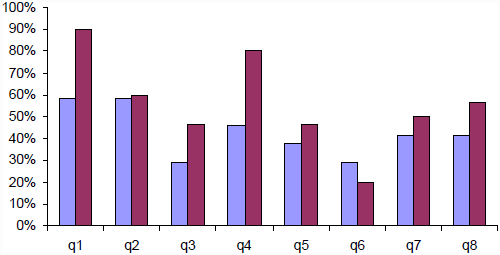Authors
Joseph Ruthruff, Amit Phalgune, Laura Beckwith, Margaret Burnett, & Curtis Cook
Abstract
Emerging research has sought to bring effective debugging devices to end-user programmers. This research has largely focused on how well such devices bring genuine "functional" rewards to end users.
However, emerging models of programming behavior indicate that another, often ignored, type of reward—perceivable rewards—can play an equally vital role in how well debugging devices serve end users.
Using an empirically evaluated fault localization device, this paper investigates the impact such perceivable rewards can have on end-user debugging.
Our results indicate that perceivable rewards alone can significantly improve the effectiveness and understanding of end users performing debugging tasks.
Sample

Participants who answered each question correctly:
- Low-Reward participants (light bars).
- High-Reward participants (dark bars).
High-Reward participants provided more correct responses than did the Low-Reward participants on all but one question.
Consequently, we conclude that High-Reward participants have a greater ability to understand fault localization feedback compared with Low-Reward participants.
Publication
2004, IEEE Symposium on Visual Languages and Human-Centric Computing, September, pages 115-122
